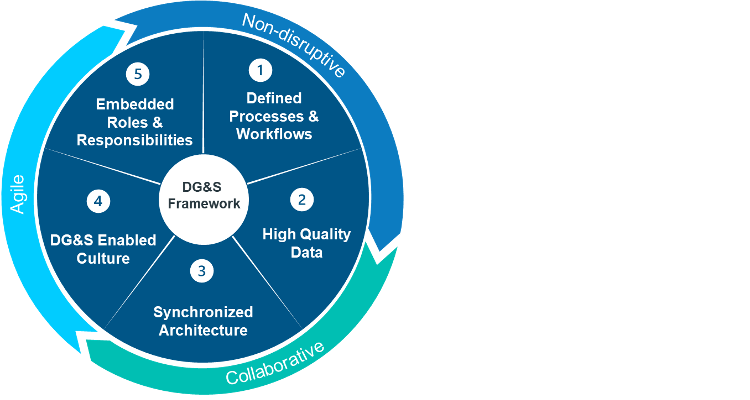





















- Blogs
- Is your Data Governance program unlocking the true potential of your Commercial Operating Model?
Changing Commercial Models
The past 5 years have ushered in a new era for Life Science Commercial Models. The explosion of volume and variety of data sources available, coupled with advancements to Machine Learning and Artificial Intelligence based platforms, has unlocked unforeseen opportunities. However, post-pandemic economic instability has also left a mark, making it all the more important that companies choose the correct opportunities. Although their respective business strategies and tactics to address these opportunities may vary, one thing remains constant across the entire industry: the need for a strong data governance program to enable the maximization of Commercial ROI, while simultaneously protecting its most critical input - data.
What is a Data Governance Program?

A holistic Data Governance & Stewardship (DG&S) program is predicted on 5 core elements.
- Confirming that there are well-defined, streamlined processes in place for managing data, which are governed by a series of policies
- Ensuring that data quality remains a paramount focus through proactive management and quantification
- Leveraging technologies and embedded business rules, to support the automation of the aforementioned processes
- Enabling a data-governance first culture, where all individuals have a strong awareness and appreciation of the impact of data governance on their day-to-day lives, and thus actively participate in adopting an organizational data governance program
- Defining and embedding clear roles and responsibilities for all actors involved in the strategizing, enablement, and use of data
In the remainder of this blog, we will focus on how a data governance program directly supports maximizing the value of Life Sciences commercial operating model.
Creating top-line growth
To support competitive differentiation, Commercial Life Science is increasingly focusing on deploying next-generation use cases such as AI&ML-based Next Best Action, Dynamic Segmentation, and Advanced Digital Channel Optimization to increase customer centricity and ultimately, revenue. These use cases require the integration of multiple data feeds from a plethora of internal and external sources. Robust data governance ensures the existence of data quality checks at both a source level and downstream, to ensure a steady ongoing stream of high-quality data is feeding these use cases. This in turn increases the reliability, validity and resulting financial value, generated by the insights.
Increasing Operational Efficiency
Most organizations have suboptimal policies and processes in place for managing data. These often involve convoluted data quality maintenance processes to support data cleaning, where business teams interspersed throughout the organization work with stewards on an ad-hoc or per needed basis to respond reactively to quality concerns. This model can result in duplicate process and learning efforts when it comes to onboarding new and managing existing data. A data governance program ensures that these inefficiencies are addressed by creating a stewardship model with clearly defined and allocated roles and responsibilities. Such a model should be as streamlined as possible, freeing up resources to work on more meaningful work.
Ensuring data compliance
Data compliance is of particular importance for pharma, in large part due to the elevated level of regulatory scrutiny and the constant evolution of regulations across different markets. Data governance plays a critical role in ensuring that through applicable policies, data is classified in accordance with its sensitivity, and that it is managed and restricted accordingly. It ensures that data is stored, archived, retained, and disposed in a manner that complies with all relevant regulations. Failure to do so can result in crippling penalties, loss of reputation and disruption to business continuity.
How to take the first steps in your journey to optimize your Data Governance Program
Optimizing and operationalizing Data Governance programs can feel like a daunting endeavor, especially when it comes to identifying where to begin.
We recommend Life Science companies begin with assessing their current data governance maturity across the 5 core elements to better understand their challenges and more importantly, diagnose the root causes. The next step is to look at the activities leveraged by other Life Science peers to solve the same problems, and then contextualizing those activities to their specific situation. Lastly, we recommend defining an overall roadmap for data governance programs with a focus on launching quick strike pilots that can be scaled based on priorities.
IQVIA supports more than 40 global pharma, medical device and healthcare companies in their data governance and stewardship needs. If you are interested in learning firsthand about how Life Science companies have leveraged Data Governance to address their challenges, please connect with us here – we would be happy to speak with you. You can learn more about IQVIA’s Data Governance and Stewardship capabilities at our website.

WEBINAR
Clean Data, Confident Decisions: The Role of Data Governance in Life Science Organizations
Watch this on demand webinar and learn from our experts how life sciences organizations are leveraging Data Governance & Stewardship to solve key industry challenges of data accuracy, quality, and compliance in global technology implementations.





